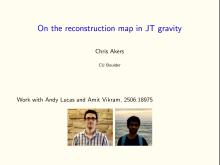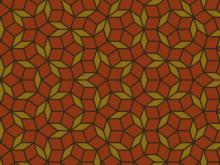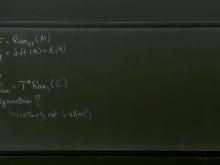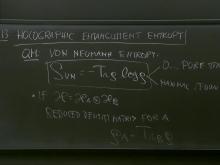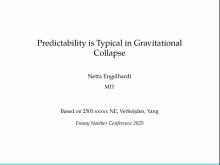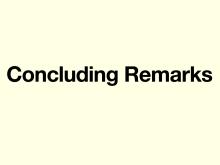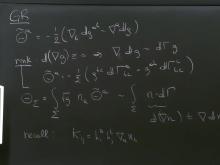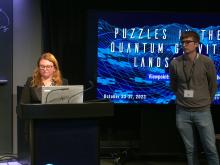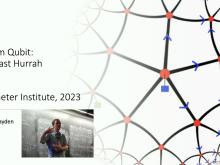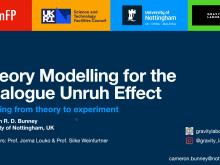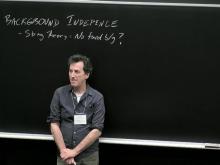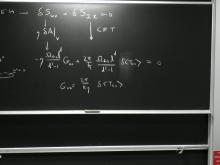Quantum gravity is concerned with unifying Einstein's general theory of relativity with quantum theory into a single theoretical framework. At Perimeter Institute, researchers are actively pursuing a number of approaches to this problem including loop quantum gravity, spin foam models, asymptotic safety, emergent gravity, string theory, and causal set theory. We are also particularly interested in experimental implications of these different proposals. As the aim is a unification of the laws of physics into a single theory, the search for quantum gravity overlaps with other areas such as cosmology, particle physics and the foundations of quantum theory.
Format results
-
29 talks-Collection NumberC25024
Talk
-

Opening Remarks
-
Marcela Carena Perimeter Institute for Theoretical Physics
-
Emily Petroff Perimeter Institute for Theoretical Physics
-
Chris Waddell Perimeter Institute for Theoretical Physics
-
-

-

Chaos and the Emergence of the Cosmological Horizon
David Kolchmeyer Massachusetts Institute of Technology
-

Operator Algebras and Third Quantization
Nima Lashkari Purdue University West Lafayette
-

Swing Surfaces in AdS/CFT
Sabrina Pasterski Perimeter Institute for Theoretical Physics
-

An Emergent Area Operator in 2d CFT
Ronak Soni Chennai Mathematical Institute
-

Gravity As An Oracle (Vision Talk)
Raphael Bousso University of California, Berkeley
-

Vacuogenesis (Vision Talk)
Ted Jacobson University of Maryland, College Park
-
-
Lee's Fest: Quantum Gravity and the Nature of Time
43 talks-Collection NumberC25023Talk
-

Opening Remarks
-
Marcela Carena Perimeter Institute for Theoretical Physics
- Laurent Freidel
PIRSA:25060029 -
-

-

-

-

-

-

Gravitational collapse, shock waves and white holes
Viqar Husain University of New Brunswick
PIRSA:25060035 -

Building and (hints of) seeing gravitational statistical mechanics
Seth Major Hamilton College
PIRSA:25060036
-
-
Quantum Gravity (Elective), PHYS 644, February 24 - March 28, 2025
13 talks-Collection NumberC25014Talk
-

Lecture - Quantum Gravity, PHYS 644
Aldo Riello Perimeter Institute for Theoretical Physics
-

Lecture - Quantum Gravity, PHYS 644
Aldo Riello Perimeter Institute for Theoretical Physics
-

Lecture - Quantum Gravity, PHYS 644
Aldo Riello Perimeter Institute for Theoretical Physics
-

Lecture - Quantum Gravity, PHYS 644
Aldo Riello Perimeter Institute for Theoretical Physics
-

Lecture - Quantum Gravity, PHYS 644
Aldo Riello Perimeter Institute for Theoretical Physics
-

Lecture - Quantum Gravity, PHYS 644
Aldo Riello Perimeter Institute for Theoretical Physics
-

Lecture - Quantum Gravity, PHYS 644
Aldo Riello Perimeter Institute for Theoretical Physics
-

Lecture - Quantum Gravity, PHYS 644
Aldo Riello Perimeter Institute for Theoretical Physics
-
-
AdS/CFT (Elective), PHYS 777, March 31 - May 2, 2025
13 talks-Collection NumberC25013Talk
-

Lecture - AdS/CFT, PHYS 777
David Kubiznak Charles University
-

Lecture - AdS/CFT, PHYS 777
David Kubiznak Charles University
-

Lecture - AdS/CFT, PHYS 777
David Kubiznak Charles University
-

Lecture - AdS/CFT, PHYS 777
David Kubiznak Charles University
-

Lecture - AdS/CFT, PHYS 777
David Kubiznak Charles University
-

Lecture - AdS/CFT, PHYS 777
David Kubiznak Charles University
-

Lecture - AdS/CFT, PHYS 777
David Kubiznak Charles University
-

Lecture - AdS/CFT, PHYS 777
David Kubiznak Charles University
-
-
Emmy Noether Workshop: Quantum Space Time
14 talks-Collection NumberC25017Talk
-

Quantum Spacetime: from Speculation to Numbers
Renate Loll Radboud Universiteit Nijmegen
-

Quantum Gravity through the lens of Effective Field Theory
Alessia Platania University of Copenhagen
-

Planck-scale violations of relativistic symmetries in astrophysics and in quantum systems
Giulia Gubitosi University of Naples Federico II
PIRSA:25030057 -

Quantum Dynamics of Causal Sets: Results and Challenges
Sumati Surya Raman Research Institute
-

Ensembles of open quantum systems as a tool for quantum spacetime
Sarah Shandera Pennsylvania State University
-

Exploring the expanding Universe with the Dark Energy Survey
Jessica Muir University of Cincinnati
-

Gravitational waves as a window on gravity
Jocelyn Read California State University, Fullerton
-

Quantum Gravity in the era of Gravitational-Wave astronomy
Mairi Sakellariadou King's College London
-
-
50 Years of Horndeski Gravity: Exploring Modified Gravity
46 talks-Collection NumberC24019Talk
-

-

-

Horndeski Gravity in Cosmology
Alessandra Silvestri Leiden University
-

How we rediscovered Horndeski gravity
Cedric Deffayet Institut d'Astrophysique de Paris
-

Black holes in Horndeski theories
Christos Charmousis The French National Centre for Scientific Research
-

Hi-COLA: Horndeski Goes Non-linear
Tessa Baker University of Portsmouth
-

Photon Rings and Shadow Size for General Axi-Symmetric and Stationary Integrable spacetimes
Kiana Salehi perimeter institute and university of Waterloo
PIRSA:24070086 -

Modified gravity getting to the one-point clustering statistics
Cora Uhlemann Bielefeld University
PIRSA:24070087
-
-
Quantum Gravity 2023/24
13 talks-Collection NumberC24024Talk
-

Quantum Gravity Lecture
Aldo Riello Perimeter Institute for Theoretical Physics
-

Quantum Gravity Lecture
Aldo Riello Perimeter Institute for Theoretical Physics
-

Quantum Gravity Lecture
Aldo Riello Perimeter Institute for Theoretical Physics
-

Quantum Gravity Lecture
Aldo Riello Perimeter Institute for Theoretical Physics
-

Quantum Gravity Lecture
Aldo Riello Perimeter Institute for Theoretical Physics
-

Quantum Gravity Lecture
Aldo Riello Perimeter Institute for Theoretical Physics
-

Quantum Gravity Lecture
Aldo Riello Perimeter Institute for Theoretical Physics
-

Quantum Gravity Lecture
Aldo Riello Perimeter Institute for Theoretical Physics
-
-
Puzzles in the Quantum Gravity Landscape: viewpoints from different approaches
34 talks-Collection NumberC23033Talk
-

Lessons of the Effective Field Theory Treatment of General Relativity
John Donoghue University of Massachusetts Amherst
-

Positivity Bounds and Effective Fields Theories (A Review)
Andrew Tolley Imperial College London
-

Holography and its implications for quantum gravity - VIRTUAL
Johanna Erdmenger University of Würzburg
-

-

Piecing Together a Flat Hologram
Sabrina Pasterski Perimeter Institute for Theoretical Physics
-

Open Discussion with today's speakers (Donoghue, Erdmenger, Montero, Pasterski, Tolley)
-
John Donoghue University of Massachusetts Amherst
-
Johanna Erdmenger University of Würzburg
-
Miguel Mlontero IFT Madrid
-
Sabrina Pasterski Perimeter Institute for Theoretical Physics
-
Andrew Tolley Imperial College London
-
-

Panel Discussion - Strengths and limitations of EFT (Donoghue, Knorr, Montero, Quevedo, Tolley)
-
John Donoghue University of Massachusetts Amherst
-
Miguel Mlontero IFT Madrid
-
Fernando Quevedo University of Cambridge
-
Carlo Rovelli Aix-Marseille University
-
Andrew Tolley Imperial College London
-
-

-
-
It from Qubit 2023
38 talks-Collection NumberC23021Talk
-

Talk 44 - Large N von Neumann Algebras and the renormalization of Newton's constant
Elliott Gesteau California Institute of Technology (Caltech)
-

Talk 88 - Type II_1 algebras for local subregions in quantum gravity
Antony Speranza University of Amsterdam
-

Talk 124 - von Neumann algebras in JT gravity with matter
David Kolchmeyer Massachusetts Institute of Technology
-

Talk 61 - Horizons are Watching You
Gautam Satishchandran -

An SYK model with a scaling similarity.
Juan Maldacena Institute for Advanced Study (IAS) - School of Natural Sciences (SNS)
-

Petz recovery from subsystems in conformal field theory
Shreya Vardhan Stanford University
-

-

-
-
Quantum Simulators of Fundamental Physics
23 talks-Collection NumberC23019Talk
-

-

Simulating one-dimensional quantum chromodynamics on a quantum computer: Real-time evolutions of tetra- and pentaquarks
Christine Muschik Institute for Quantum Computing (IQC)
-

-

Five short talks - see description for talk titles
-
Barbara Soda Perimeter Institute for Theoretical Physics
-
Dalila Pirvu Invisible Technologies
- Leonardo Solidoro, Pietro Smaniotto, Kate Brown
-
-

First observations of false vacuum decay in a BEC
Ian Moss Newcastle University
-

Building Quantum Simulators for QuFTs
Jorg Schmiedmayer Technical University of Vienna
-

-

-
-
Quantum Spacetime in the Cosmos: From Conception to Reality
32 talks-Collection NumberC23035Talk
-

Welcome and Opening Remarks
Niayesh Afshordi University of Waterloo & Perimeter Institute
-

Quantum Gravity and its connection to observations
Astrid Eichhorn Universität Heidelberg
-

-

The Spacetime of Acceleration
Ruth Gregory King's College London
-

What is the simplicity of the early universe trying to tell us?
Latham Boyle University of Edinburgh
-

Are we considering enough? Inclusivity in Quantum Gravity and Cosmology
Jarita Holbrook University of Edinburgh
-

-

Emergent Metric Space-Time from the BFSS Matrix Model
Robert Brandenberger McGill University - Department of Physics
-
-
Horizon entropy and the Einstein equation
4 talks-Collection NumberC23029Talk
-

Horizon entropy and the Einstein equation - Lecture 20230221
Ted Jacobson University of Maryland, College Park
-

Horizon entropy and the Einstein equation - Lecture 20230223
Ted Jacobson University of Maryland, College Park
-

Horizon entropy and the Einstein equation - Lecture 20230228
Ted Jacobson University of Maryland, College Park
-

Horizon entropy and the Einstein equation - Lecture 20230302
Ted Jacobson University of Maryland, College Park
-
-
QIQG 2025
29 talks-Collection NumberC25024
QIQG 2025: Quantum Information in Quantum Gravity
QIQG 2025: Quantum Information In Quantum Gravity will unite researchers working at the intersection of quantum information theory and quantum gravity, to exchange insights and showcase recent developments bridging these fields. As part of the celebrations of Perimeter’s 25th anniversary, we will also feature vision talks by world-leading experts exploring pivotal and emerging themes at the nexus of quantum information and quantum gravity. Our program will span topics such as:- Algebraic approaches to field theory and gravity
- Observers, quantum reference frames, and relational observables
- Quantum focussing and the Generalized Second Law
- SYK and its double-scaled limit
- The quantum information theoretic structure of spacetime
- Edge modes and entanglement entropy across subregions
- The role of complexity in field theory and gravity
- The black-hole information puzzle and related issues
- Quantum error-correcting codes in quantum field theory and quantum gravity
- Quantum cryptography and its implications for gravity
- Gravitational wormholes and their information-theoretic implications
- Chaos and thermalization in many-body systems and their realization in quantum gravity
- Holographic cosmology and de Sitter space
:: :: ::
Scientific Organizers
Luca Ciambelli (Perimeter Institute)
Rob Myers (Perimeter Institute)
Chris Waddell (Perimeter Institute)
Beni Yoshida (Perimeter Institute)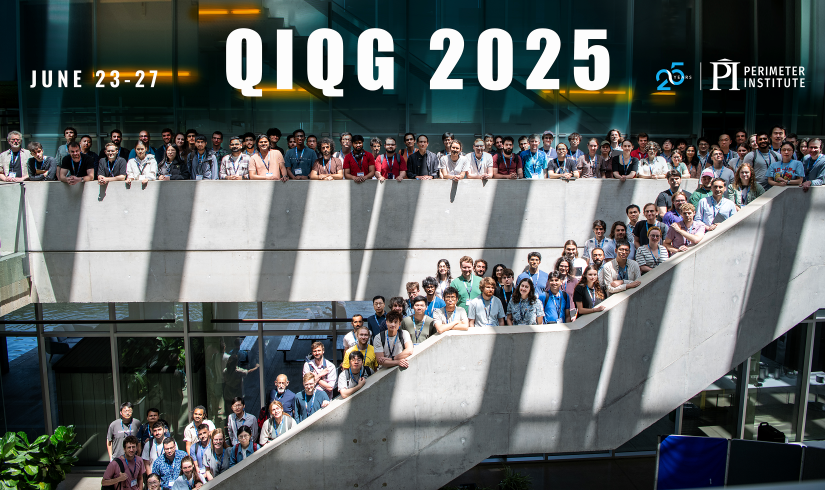
-
Lee's Fest: Quantum Gravity and the Nature of Time
43 talks-Collection NumberC25023
What is time? Is it fundamental or emergent? This question lies at the foundation of contemporary physics and provides a key to unlocking some of its most challenging open problems, from quantum gravity to cosmology. The quest to understand time extends beyond the realm of physics, providing a privileged standpoint to address questions in diverse fields such as philosophy, mathematics, and computer science.
In this conference, we explore the nature of time from many different perspectives. This is the occasion to honor Perimeter’s “Master of Time,” Lee Smolin, and to celebrate his seminal scientific contributions. Lee Smolin is a founding faculty member of Perimeter Institute and a primary inspiration behind its spirit and design. This is an opportunity to journey back in time to the origins of some of the groundbreaking initiatives that Lee helped develop, and to look forward to future developments inspired by his achievements. The conference focuses on time but also on the foundations of quantum mechanics and the quest for quantum gravity, particularly Loop Quantum Gravity, of which Lee Smolin is a co-creator. In the spirit of Lee Smolin, the conference celebrates the interdisciplinary nature of the journey toward quantum gravity, with contributions from physics, mathematics, computer science, and philosophy.
:: :: ::
Scientific Organizers
Laurent Freidel (Perimeter Institute)
Maïté Dupuis (Perimeter Institute)
Dongxue Qu (Perimeter Institute)
Francesca Vidotto (Western University):: :: ::
Speakers
- Niayesh Afshordi (University of Waterloo)
- Stephon Alexander (Brown University)
- Giovanni Amelino-Camelia (University of Naples Federico II)
- Julian Barbour (Independent)
- Bianca Dittrich (Perimeter Institute)
- Fay Dowker (Imperial College)
- Avshalom Elitzur (Chapman University)
- Lucien Hardy (Perimeter Institute)
- Viqar Husain (University of New Brunswick)
- Jenann Ismael (Johns Hopkins University)
- Ted Jacobson (Maryland University)
- Jaron Lanier (Microsoft Research)
- Etera Livine (Lyon, Ecole Normale Superieure)
- João Magueijo (Imperial College London)
- Seth Major (Hamilton College)
- Carlo Rovelli (Aix-Marseille University)
- Simon Saunders (Oxford University)
- Simone Speziale (Aix-Marseille University)
- Francesca Vidotto (Western University)
- Steven Weinstein (University of Waterloo)
:: :: ::
Credit: Artwork by Kaća Bradonjić -
Quantum Gravity (Elective), PHYS 644, February 24 - March 28, 2025
13 talks-Collection NumberC25014The main goal of this course is to show in which ways General Relativity (GR) is similar, and especially in which ways it is different, from other gauge theories. The largest component of the course is dedicated to studying the specific symmetry structure of GR and how it intimately relates to its dynamics. To do so, we will introduce a host of concepts and techniques, broadly (and loosely) known under the name of “Covariant Phase Space Method”. This provides a different perspective on GR’s physics, a perspective in which phase space, rather than spacetime, is front and center. Along the way we will take a few detours: we will explore (parts of) the historical debate on whether gravity should be quantized at all, discuss how to think of time evolution when there is no absolute time, and go through Wald’s proposal of black hole entropy as a Noether charge. The intended outcome of the course is to provide a new perspective on GR which, hopefully, will inform you on why it is much harder to quantize than other theories – especially from a non-perturbative perspective. In this sense the course always keeps an eye on Quantum Gravity, even though there will be very little “quantum” in it. It is also a course that does not hinge on any specific approach to the quantization of gravity. Also, it is worth noting that the covariant phase space techniques are broadly used in the current literature on the black hole information paradox, soft symmetries, and holography, and is therefore a useful tool to learn if you are interested in any of these topics. Instructor: Aldo Riello Students who are not part of the PSI MSc program should review enrollment and course format information here: https://perimeterinstitute.ca/graduate-courses -
AdS/CFT (Elective), PHYS 777, March 31 - May 2, 2025
13 talks-Collection NumberC25013We will cover the basics of the gauge/gravity duality, including some of the following aspects: holographic fluids, applications to condensed matter systems, entanglement entropy, and recent advances in understanding the black hole information paradox. Instructor: David Kubiznak/Gang Xu Students who are not part of the PSI MSc program should review enrollment and course format information here: https://perimeterinstitute.ca/graduate-courses -
Emmy Noether Workshop: Quantum Space Time
14 talks-Collection NumberC25017
Constructing a theory of quantum gravity, and with it a notion of quantum spacetime is one of the biggest challenges faced by modern theoretical physics. This workshop will bring together researchers from a wide range of viewpoints and give them an opportunity to exchange ideas and gain new insights.
The workshop is supported by the Simons Foundation.
:: :: ::
Workshop Speakers
Marcela Carena (Perimeter Institute)
Astrid Eichhorn (Universität Heidelberg)
Netta Englehardt (MIT)
Johanna Erdmenger (University of Würzburg)
Gulia Gubitosi (University of Naples Federico II)
Renate Loll (Radboud University)
Jessica Muir (Perimeter Institute)
A.W. Peet (University of Toronto)
Alessia Platania (University of Copenhagen)
Jocelyn Read (California State University, Fullerton)
Kasia Rejzner (York University)
Mairi Sakellariadou (King's College London)
Sarah Shandera (Pennsylvania State University)
Sumati Surya (Raman Research Institute)
Karen Yeats (University of Waterloo):: :: ::
Scientific Organizers
Bianca Dittrich (Perimeter Institute)
Sabrina Pasterski (Perimeter Institute)
Céline Zwikel (Perimeter Institute)
Sruthi Narayanan (Perimeter Institute) -
50 Years of Horndeski Gravity: Exploring Modified Gravity
46 talks-Collection NumberC24019
Recent years have seen a flood of new data, from gravitational wave observations of merging black holes and neutron stars to precision probes of cosmology, which allow for unprecedented tests of our understanding of gravity. Going hand-in-hand with this, there has been significant recent progress on the theoretical side in terms of formulating modified theories of gravity, and using them to make detailed predictions, including in the nonlinear and dynamical regime, which can be confronted with the observations.
We are excited to announce a landmark conference that plans to delve into the forefront of research on modified theories of gravity and brings together leading experts from different disciplines including observational astrophysicists, numerical relativists, cosmologists and mathematical physicists to explore the present status of modified theories of gravity and envision their future theoretical development and implications for observations.
This conference is also timed to coincide with the 50th anniversary of pioneering work in this area carried out by Gregory Horndeski in the Waterloo Mathematical Physics Community. Hosted jointly by Perimeter Institute and the University of Waterloo, this conference will serve as a forum for researchers from different disciplines to exchange ideas at the cutting
edge of gravitational physics.
Presented by:

Sponsored in part by Gravity Theory Trust
:: :: ::Topics:
• Modified Gravity Theories: Theoretical Framework and Models
• Tests of modified Gravity with Gravitational Waves (LIGO/LISA/PTA)
• Astrophysical/cosmological tests of gravity
• Mathematical structure of Modified gravity
• Observational tests of quantum gravity
• Modified gravity in the early universeConference Structure:
The conference will feature a balanced blend of plenary sessions (invited Speakers), contributed talks, panel discussions and poster presentations for students.
• Keynote presentations by renowned physicists in the field, discussing the impact of Horndeski theories and other modified theories of gravity on cosmology, dark energy, and black hole physics.
• Contributed talks: prioritizing early-career researchers
• Panel discussions on emerging research directions, unresolved questions, and potential applications of Horndeski theories.
• Poster sessions for early-career researchers and graduate students to showcase their work and receive feedback from senior scientists.:: :: ::
Scientific Organizers:
- Ghazal Geshnizjani (Perimeter Institute, SOC Chair)
- William East (Perimeter Institute)
- Levon Pogosian (Simon Fraser University, Perimeter Institute Affiliate)
- Niayesh Afshordi (Perimeter Institute, U Waterloo, LOC Chair)
- Will Percival (Perimeter Institute, U Waterloo)
- Florian Girelli (U Waterloo, Perimeter Institute Affiliate)
- Jerome Quintin (U Waterloo, Perimeter Institute)
- Alex Krolewski (U Waterloo, Perimeter Institute, CITA)
:: :: ::
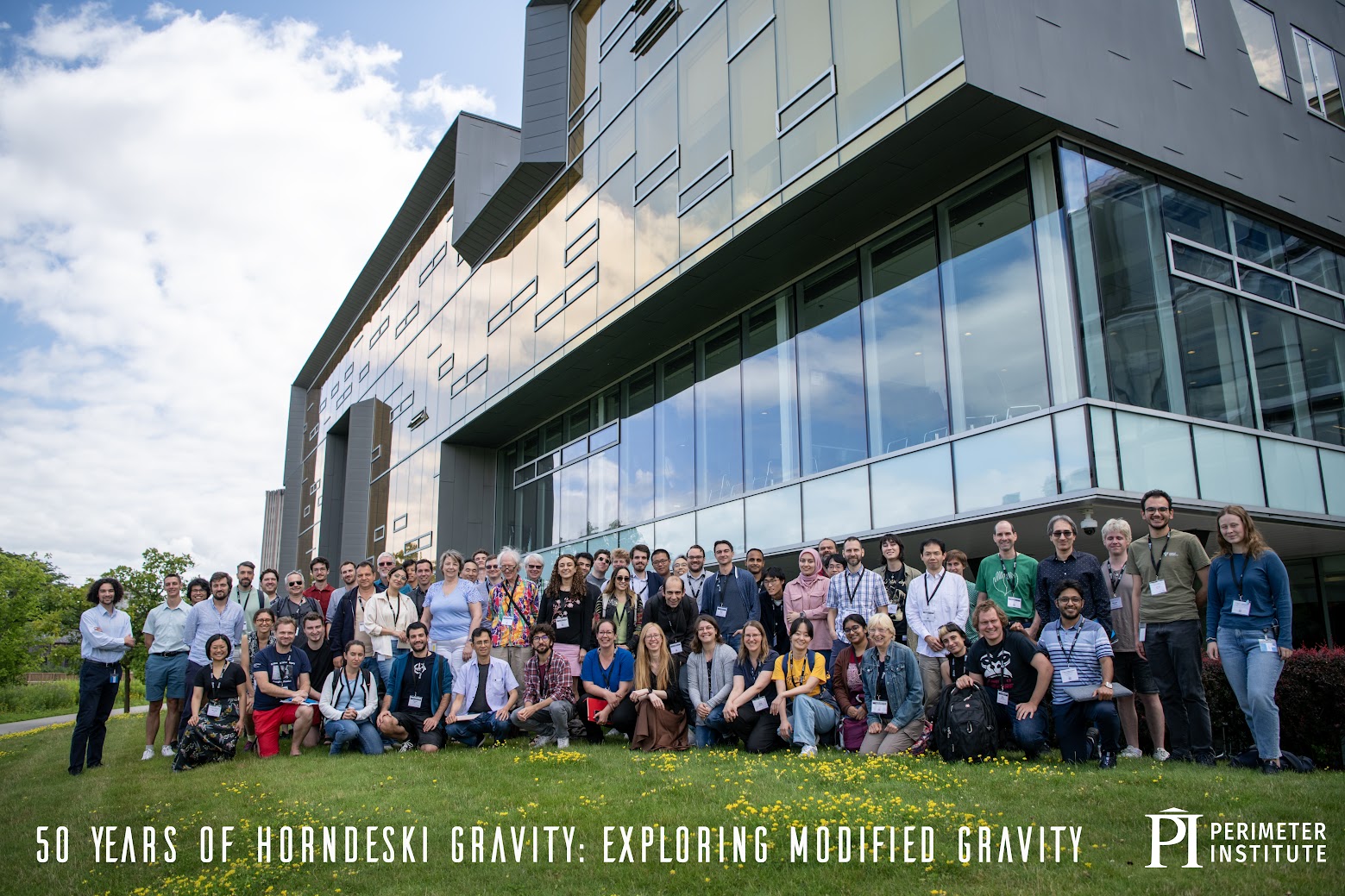
-
Quantum Gravity 2023/24
13 talks-Collection NumberC24024The course centers on an in-depth study of the symmetry structure of General Relativity and how this is intimately related to its dynamics and to the challenges posed to its quantization. To achieve this understanding, we will introduce a host of concepts and techniques, broadly (and loosely) known under the name of “Covariant Phase Space Method”. This provides a different perspective on GR’s physics, a perspective in which phase space, rather than spacetime, is front and center. We will apply these ideas and techniques to discuss the so-called Problem of Time, Wald's approach to black hole entropy as a Noether charge, and the relationship between Dirac's Hypersurface Deformation Algebra and GR's symmetries and dynamics. We will also discuss the problem of detecting single gravitons as well as crucial analogies and differences between a quantum electromagnetic and gravitational field. Lecture notes specific for the course will be provided. -
Puzzles in the Quantum Gravity Landscape: viewpoints from different approaches
34 talks-Collection NumberC23033Unraveling the quantum nature of gravity is one of the most pressing problems of theoretical physics. Several ideas have been put forward and resulted in a number of theories of quantum gravity. While these theories have explored different facets of the “quantum gravity landscape”, all viable approaches should ultimately make contact with observations, and answer exciting questions in cosmology and black-hole physics.
Sharing knowledge, exchanging ideas, and building a dictionary between different theories are crucial steps toward answering these questions, efficiently contrasting different theories, and ultimately reaching a deeper understanding of our Universe.
This conference will contribute to these goals by bringing together leading experts in different approaches to quantum gravity, gravitational effective field theory, black-hole physics, and cosmology. We will focus on specific puzzles in quantum gravity and their resolutions within different approaches. The conference will be highly interactive, with plenty of time to discuss common problems, understand the big picture, and develop novel connections between fields.Registration: Registration is now open, and both in-person and virtual participation is welcome. Online participants will be able to interact on an equal footing in question sessions and discussions. In-person attendance is limited and will be approved on a first-come, first-served basis. Talks are by invitation only, but in-person participants are encouraged to apply to present a poster.
Spam warning: There is an increasing number of scam agencies reaching out to conference speakers and attendees. Perimeter Institute does not use third-party agencies. We advise speakers and attendees to ignore emails and not to provide any details to anyone who is not from Perimeter Institute.
Confirmed Speakers and Panelists:
- Abhay Ashtekar (Penn State University)
- Robert Brandenberger (McGill University)
- Luca Buoninfante (Nordita)
- Xavier Calmet (University of Sussex)
- Francesco di Filippo (Kyoto University)
- Bianca Dittrich (Perimeter Institute)
- John Donoghue (University of Massachusetts)
- Astrid Eichhorn (CP3-origins)
- Johanna Erdmenger (Würzburg University)
- Ghazal Geshnizjani (Perimeter Institute)
- Ruth Gregory (King's College)
- Lavinia Heisenberg (Heidelberg University)
- Bob Holdom (University of Toronto)
- Benjamin Knorr (Nordita)
- Renate Loll (Radboud University Nijmegen)
- Miguel Montero (IFT Madrid)
- Rob Myers (Perimeter Institute)
- Sabrina Pasterski (Perimeter Institute)
- Fernando Quevedo (Cambridge University)
- Lisa Randall (Harvard University)
- Kasia Rejzner (York University)
- Mairi Sakellariadou (King's College)
- Lee Smolin (Perimeter Institute)
- Kellogg Stelle (Imperial College)
- Sumati Surya (Raman Research Institute)
- Andrew Tolley (Imperial College)
- Neil Turok (University of Edinburgh)
- Pedro Vieira (Perimeter Institute)
- Yasaman Yazdi (Imperial College)
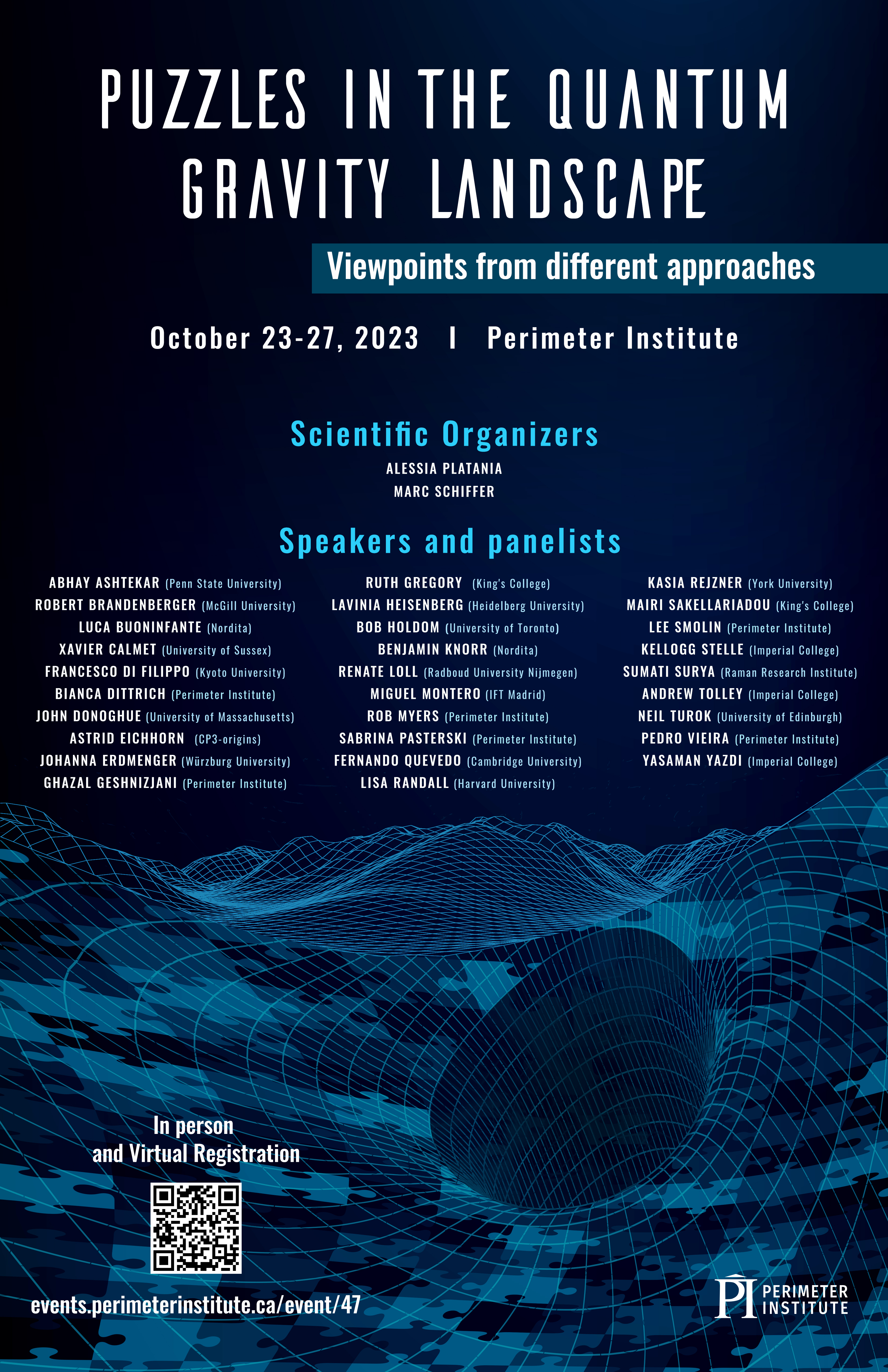
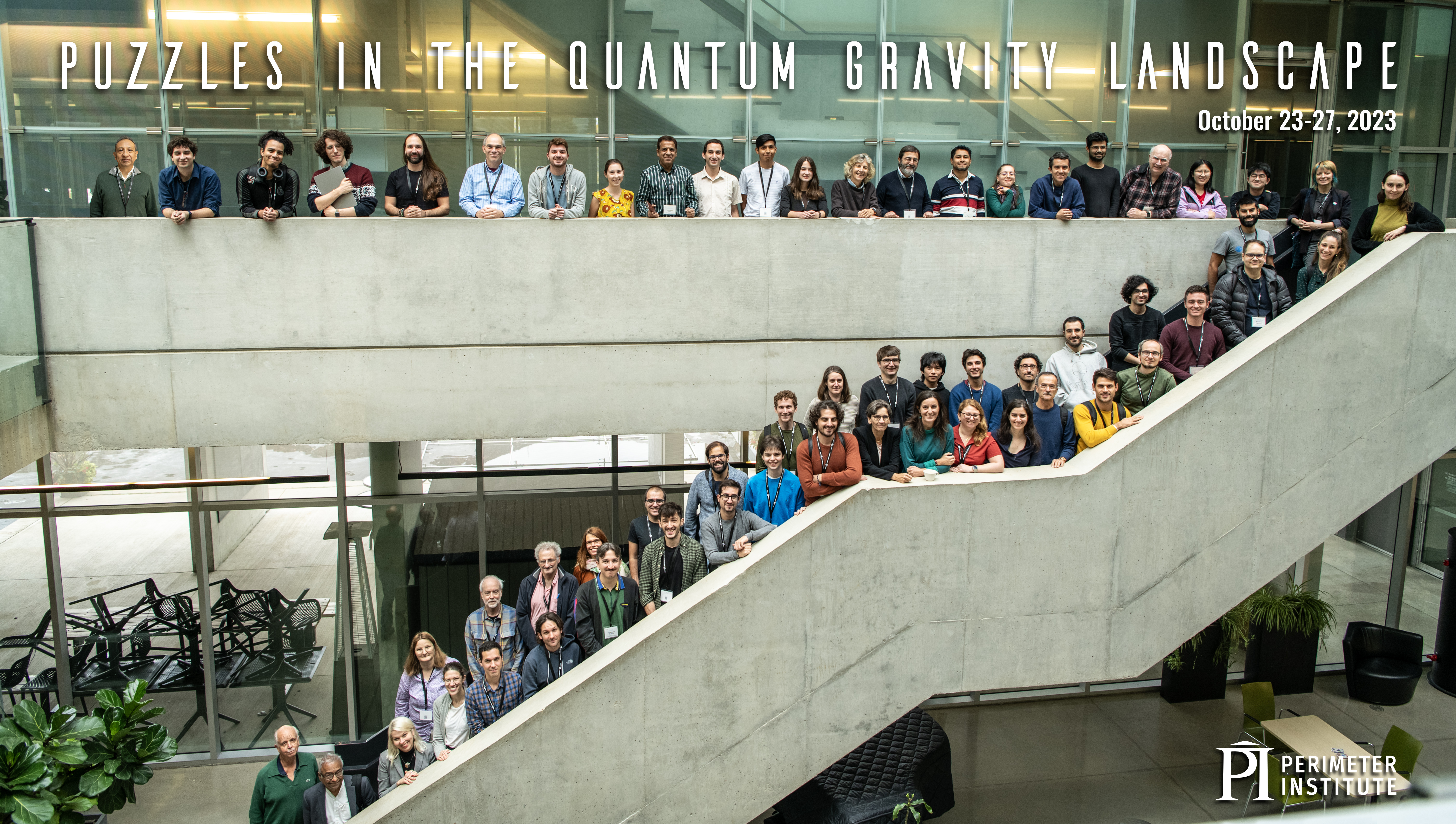
Territorial Land Acknowledgement
Perimeter Institute acknowledges that it is situated on the traditional territory of the Anishinaabe, Haudenosaunee, and Neutral peoples.
Perimeter Institute is located on the Haldimand Tract. After the American Revolution, the tract was granted by the British to the Six Nations of the Grand River and the Mississaugas of the Credit First Nation as compensation for their role in the war and for the loss of their traditional lands in upstate New York. Of the 950,000 acres granted to the Haudenosaunee, less than 5 percent remains Six Nations land. Only 6,100 acres remain Mississaugas of the Credit land.
We thank the Anishinaabe, Haudenosaunee, and Neutral peoples for hosting us on their land.
-
It from Qubit 2023
38 talks-Collection NumberC23021The final meeting of It from Qubit: Simons Collaboration on Quantum Fields, Gravity, and Information will be devoted to recent developments at the interface of fundamental physics and quantum information theory, spanning topics such as
- chaos and thermalization in many-body systems and their realization in quantum gravity;
- information-theoretic constraints on quantum field theories and their RG flows and symmetries;
- gravitational wormholes and their information-theoretic implications;
- calculable lower-dimensional models of quantum gravity; the entanglement structure of semi-classical states in quantum gravity;
- quantum error-correcting codes in quantum field theory and quantum gravity;
- complexity in field theory and gravity;
- the black-hole information puzzle;
- quantum simulation of quantum field theories and quantum gravity.
Recorded talks: https://pirsa.org/C23021
Territorial Land Acknowledgement
Perimeter Institute acknowledges that it is situated on the traditional territory of the Anishinaabe, Haudenosaunee, and Neutral peoples.
Perimeter Institute is located on the Haldimand Tract. After the American Revolution, the tract was granted by the British to the Six Nations of the Grand River and the Mississaugas of the Credit First Nation as compensation for their role in the war and for the loss of their traditional lands in upstate New York. Of the 950,000 acres granted to the Haudenosaunee, less than 5 percent remains Six Nations land. Only 6,100 acres remain Mississaugas of the Credit land.
We thank the Anishinaabe, Haudenosaunee, and Neutral peoples for hosting us on their land.
-
Quantum Simulators of Fundamental Physics
23 talks-Collection NumberC23019This meeting will bring together researchers from the quantum technology, atomic physics, and fundamental physics communities to discuss how quantum simulation can be used to gain new insight into the physics of black holes and the early Universe. The core program of the workshop is intended to deepen collaboration between the UK-based Quantum Simulators for Fundamental Physics (QSimFP; https://www.qsimfp.org) consortium and researchers at Perimeter Institute and neighbouring institutions. The week-long conference will consist of broadly-accessible talks on work within the consortium and work within the broader community of researchers interested in quantum simulation, as well as a poster session and ample time for discussion and collaboration
Territorial Land AcknowledgementPerimeter Institute acknowledges that it is situated on the traditional territory of the Anishinaabe, Haudenosaunee, and Neutral peoples.
Perimeter Institute is located on the Haldimand Tract. After the American Revolution, the tract was granted by the British to the Six Nations of the Grand River and the Mississaugas of the Credit First Nation as compensation for their role in the war and for the loss of their traditional lands in upstate New York. Of the 950,000 acres granted to the Haudenosaunee, less than 5 percent remains Six Nations land. Only 6,100 acres remain Mississaugas of the Credit land.
We thank the Anishinaabe, Haudenosaunee, and Neutral peoples for hosting us on their land.
-
Quantum Spacetime in the Cosmos: From Conception to Reality
32 talks-Collection NumberC23035On Demand Recording: https://pirsa.org/C23035
The nature of space and time is one of the most foundational mysteries in both Physics and Philosophy. At the heart of this mystery are the two most successful theories of nature: Einstein's theory of relativity, an elegant and precise description of the geometry of our universe on large scales, and Quantum Mechanics, outlining accurate laws of interaction in the subatomic world. But these two great triumphs of 20th century physics remain inherently inconsistent, contradictory in their most basic principles, such as locality and causality. Nonetheless, the experimental domains or natural phenomena where these contradictions become manifest have remained elusive, and it is not clear that a century of theoretical investigation into quantum gravity is anywhere close to being verified in nature.
Arguably, this disconnect is our greatest and most foundational challenge in the history of Physics; despite groundbreaking progress in both theory and observations of quantum spacetimes, these two endeavours are moving farther apart. Successfully responding to this century-old challenge could require rethinking the epistemology of fundamental physics. While physicists are trained to push the frontiers of knowledge, developing a grand vision of the arch of history, and where we are (or should be) heading is a more interdisciplinary endeavor, requiring insights from theory and observations, but also philosophy and history.
We plan a focused, interactive, and highly interdisciplinary workshop, involving the world’s best theorists, observers, experimentalists, and philosophers, within a supportive, inclusive, and diverse environment, in order to kick start a long term initiative that might be our best bet to make significant progress towards uncovering the quantum nature of spacetime.Sponsorship provided by:
Territorial Land AcknowledgemenPerimeter Institute acknowledges that it is situated on the traditional territory of the Anishinaabe, Haudenosaunee, and Neutral peoples.
Perimeter Institute is located on the Haldimand Tract. After the American Revolution, the tract was granted by the British to the Six Nations of the Grand River and the Mississaugas of the Credit First Nation as compensation for their role in the war and for the loss of their traditional lands in upstate New York. Of the 950,000 acres granted to the Haudenosaunee, less than 5 percent remains Six Nations land. Only 6,100 acres remain Mississaugas of the Credit land.
We thank the Anishinaabe, Haudenosaunee, and Neutral peoples for hosting us on their land.
-
Horizon entropy and the Einstein equation
4 talks-Collection NumberC23029This mini-course of four lectures is an introduction, review, and critique of two approaches to deriving the Einstein equation from hypotheses about horizon entropy.
It will be based on two papers:
- "Thermodynamics of Spacetime: The Einstein Equation of State" arxiv.org/abs/gr-qc/9504004
- "Entanglement Equilibrium and the Einstein Equation" arxiv.org/abs/1505.04753
We may also discuss ideas in "Gravitation and vacuum entanglement entropy" arxiv.org/abs/1204.6349
Zoom Link: https://pitp.zoom.us/j/96212372067?pwd=dWVaUFFFc3c5NTlVTDFHOGhCV2pXdz09
